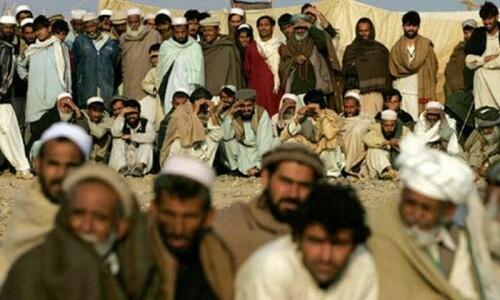ISLAMABAD: The government has called a meeting of the Economic Coordination Committee (ECC) of the cabinet on Monday to take up gas load management plan for the winter as complaints of low gas pressure and supply shortages have started to pour in.
To be presided over by Finance Minister Asad Umar, the ECC meeting is expected to take up a 4-point agenda including allocations of small gas quantities from two new fields and issues arising out of construction of two LNG terminals and how to address them.
The coming winter months – December to February – are expected to be very tough for urban residential consumers in terms of gas shortfalls amid commitment by the new government to ensure uninterrupted gas supplies to the industrial sector, particularly the zero rated five export industries at highly subsidised prices.
Sources said the petroleum division estimated up to 50pc gas shortfall to urban population in Punjab and to some extent in Khyber Pakhtunkhwa, — both being served by Sui Northern Gas Pipelines Limited (SNGPL). It has proposed providing direct subsidy to the SNGPL for domestic consumers with an injection of about 150 million cubic feet per day (MMCFD) additional gas at three peak consumption intervals around cooking hours.
As winter begins, complaints of low pressure and shortages start pouring in
The sources said the government may have to shift the entire industry including the five zero rated export sectors and power generation to imported liquefied natural gas (LNG) instead of domestic gas supplies and yet spare 150 MMCFD for residential consumers at breakfast, lunch and dinner timings even if this required diverting some LNG supplies to the residential sector.
The challenge is the price differential that requires the government approval for additional subsidy after it committed about Rs44 billion subsidy for zero rated export sectors. The average cost of domestic gas is about Rs630 per million British Thermal Unit (MMBTU) compared to about Rs1,350 of LNG. The problem is that majority of domestic consumers are entitled to gas price ranging between Rs150 and Rs300 per MMBTU.
The petroleum division believes that without additional subsidy, the domestic and commercial consumers would not get enough gas even for cooking in Punjab as SNGPL’s domestic gas share has plummeted to about 1,060 MMCFD. The peak demand of residential consumers could touch 900 MMCFD, but the authorities advise the government not to bother about uninterrupted supplies round the clock.
The total domestic gas supply through transmission pipeline network is currently estimated at about 2,240 MMCFD including about 1,175mmcfd of Sui Southern Gas Company that severs Sindh and Balochistan and about 1,060 MMCFD in the SNGPL network where demand for domestic consumers increased from about 500 MMCFD in summers to about 900 MMCFD in peak winter.
The problem has aggravated financially after the PTI government committed that 100pc re-gasified liquefied natural gas (RLNG) would be provided to zero-rated industry from December to February at a flat rate of $6.5 per MMBTU. The current RLNG rate stood at about $12.5 per MMBTU.
After February, a blend of domestic natural gas and RLNG of 50:50 would be provided to zero-rated industry from March to November. Under the decision, the SNGPL will invoice the zero-rated industry at notified prices (RLNG) and upon receipt of subsidy from the Finance Division on a monthly basis, the subsequent invoices to industry will be adjusted at the ECC-approved weighted average price of $6.5 per MMBTU.
On receipt of subsidy, the SNGPL will onward credit the amount to consumers through immediate adjustment in the subsequent gas bills. It was agreed that the subsidy would be restricted to a maximum of 185 MMCFD — according to last year consumption — with 10pc variation.
Published in Dawn, November 12th, 2018

















































